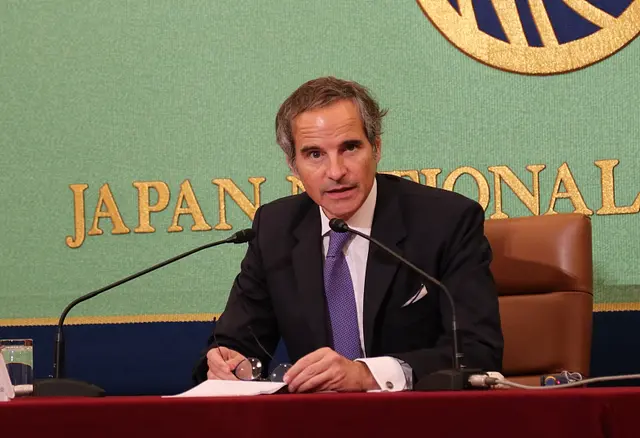Japan's plan on dumping the treated nuclear wastewater is expected to move forward as the International Atomic Energy Agency (IAEA) endorsed the plan, saying it's consistent with IAEA safety standards, on Tuesday.
The country has evoked waves of doubts and concerns over safety since it announced it would discharge the treated radioactive wastewater into the sea last year, a plan strongly opposed by local fishing communities and neighboring countries.
The Fukushima plant has stored around 1.3 million cubic meters of treated water. As the storage space is about to run out, Tokyo Electric Power Company (TEPCO) has been rushing the plan to dump the wastewater into the ocean.
Although Japan repeatedly claimed the treated wastewater would meet the standard and be harmless to people, there has already been an impact on marine life. Early this June, a report released by the operator of the plant, TEPCO, showed the content of Cs-137 (a radioactive element that is a common byproduct in nuclear reactors) in the marine fish caught in the harbor of the plant was 180 times that of the standard maximum stipulated in Japan's food safety law.
Even the system to release the hazardous nuclide into the water was found damaged, leaking radioactive contamination in 2021.
Chen Zhi, associate professor at the University of Science and Technology of China and also the executive director of Chinese Society of Radiation Protection, criticized the approach of just releasing the wastewater into the sea as being too crude and simple. "It's the crudest, simplest way, with lowest cost."
He added that it's not legitimate to dump the radioactive water into the sea. "No matter how much water there is, they shouldn't just let it go into the sea."
Ignoring alternatives
Releasing the wastewater into the sea is not the only way. In fact, multiple approaches have been proposed.
The International Atomic Energy Agency (IAEA) on Tuesday presented the comprehensive findings of its safety review of Japan's plan to release "treated water" from the Fukushima Daiichi nuclear power plant into the sea to Japanese Prime Minister Fumio Kishida.
IAEA has concluded that Japan's plans to release "treated water" stored at the power plant into the sea are consistent with IAEA safety standards, and the discharges of the "treated water" would have a negligible radiological impact on people and the environment, IAEA Director General Rafael Mariano Grossi said in a foreword of the report.
But Rafael Grossi noted that IAEA's safety review will continue during the whole discharge process, and the agency will also maintain a constant on-site presence and provide "real-time online monitoring" on its website from the emission facilities.
"This will ensure the relevant international safety standards continue to be applied throughout the decades-long process laid out by the Government of Japan and TEPCO," Rafael Grossi added.
"Japan has limited the mandate of the IAEA task force from the very beginning, and the agency is not authorized to evaluate other options than the discharge into the ocean," Chinese Foreign Ministry spokesperson Mao Ning said earlier on Tuesday before the report was published at a regular press conference.
"In this case, the IAEA report cannot prove the legitimacy and legality of Japan's ocean discharge plan, nor can it absolve Japan of its moral responsibility and obligations under international law," the spokesperson noted.
Despite ongoing opposition from within the country and abroad, Japan has been rushing to carry out its plan to dump radioactive wastewater into the Pacific Ocean, causing growing anger and stoking fears among the global community.
Japan's Chief Cabinet Secretary Hirokazu Matsuno said on Monday that the country will not change its plan to discharge Fukushima nuclear-contaminated water in the summer, local media outlet Jiji Press reported.uclear-contaminated wastewater came into direct contact with radioactive materials during the accident and is highly radioactive, which must be strictly stored and treated by multiple processes and evaluated by experts before it is allowed to be discharged.
"The coast of Fukushima has the strongest ocean currents in the world. Ten years after the nuclear-contaminated water is discharged into the sea, the radionuclides will spread to the seas of the world. This move transfers the risk to all human beings," a Chinese representative once said to the World Health Assembly in Geneva in May.
(CGTN)
 简体中文
简体中文

